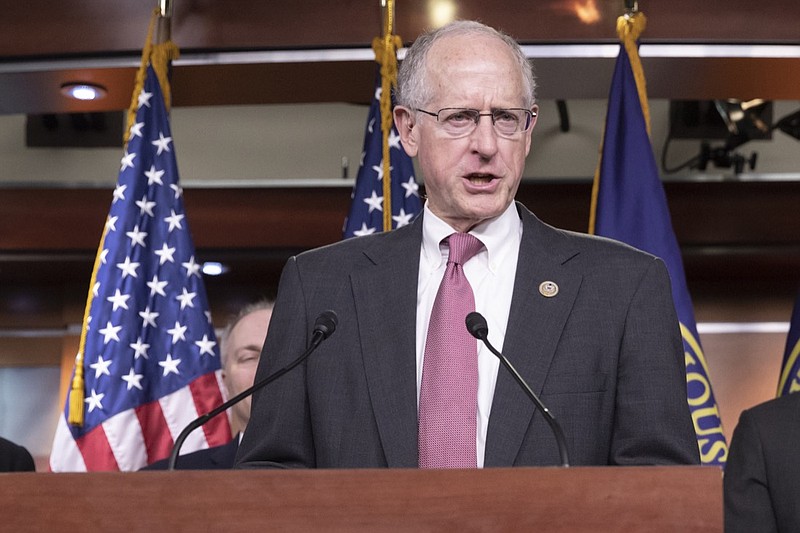Let's put food on the table
The Farm Bill, passed last week and now awaiting the president's signature, does some good things and some bad things.
On the good side, within the Farm Bill itself, is the reauthorization of crop insurance and conservation programs. It pays for trade programs, bioenergy production and organic farming research. It legalizes the cultivation of industrial hemp - a new market for farmers. A careful Congress was able to prevent amendments that would make food stamps harder to get and keep. And a bill attached to the Farm Bill helped get Tennessee wilderness areas expanded and further protected.
On the bad side, it ignores the real problems in American agriculture - meaning it does little to support small and midsize farmers and much to help the massive corporate farms that most of us know are trouble.
For years, Farm Bill subsidies have been skewed to the rich and powerful. "The 2018 subsidies - nearly $900 billion worth - reinforces the status quo," writes The New York Times.
And it grows the inequality further by allowing farmers' children and spouses - without ever having set foot on the farm - to count as "actively engaged" in farming, thus qualifying them for $125,000 worth of subsidy payments. It also allows nephews, nieces and cousins to be "daisy chained" in to receive these payments as well.
The rich get richer - even on a farm.
Who's talking up revolt?
President Donald Trump on Tuesday threw his crowd another dog whistle - suggesting there would be chaos across the country if he were impeached.
"I'm not concerned, no," the president told Reuters reporters about any potential impeachment proceeding that might be brought against him.
"I think that the people would revolt if that happened," he said matter-of-factly during an interview in the Oval Office.
Just imagine for a moment how Republican heads would explode if Barack Obama had said that.
What if Hillary Clinton had said it? What if she said, "Lock him up!"
Remember when House Speaker Paul Ryan blasted Democratic Rep. Maxine Waters, saying she should apologize for calling on those who opposed the Trump administration's policy, the one that resulted in family separation, to "harass" members of the administration in public?
Ryan called her comments "dangerous" for society and democracy. "She obviously should apologize," he said.
Has anyone heard Ryan call on the president to apologize for fully expecting his supporters to revolt?
But, really, why would anyone think Trump - the man who led a presidential campaign so in bed with Russia that five people tied to the campaign have now pleaded guilty as a result of probes into Russian election meddling - should be impeached?
Why would anyone think Trump - the man who directed hush money payments to women he feared would threaten his successful election by talking about their affairs with him - should be impeached?
And why would anyone think Trump - the president-elect whose inaugural party fund is now being looked at for possible illegal foreign cash solicitations - should be impeached?
Musical chairs for chief of staff
Mick Mulvaney, now director of the Office of Management and Budget, will replace Gen. John Kelly as Trump's chief of staff. Kelly, who earlier this year was forced to deny he had called Trump an "idiot," is leaving by the end of the year, and Trump named Mulvaney as "acting" chief of staff on Friday.
One hopes Mulvaney agreed to the change. Last week, it seems names were eliminated faster than they could be considered.
Trump unceremoniously dumped Kelly by announcing his departure date recently. Then Trump announced that his first choice for Kelly's replacement was Nick Ayers, a Georgia political operative who is now Vice President Mike Pence's chief of staff. But Ayers turned down the offer and plans to leave the administration.
Republican Rep. Mark Meadows of North Carolina, who said publicly that he was interested in the job, was ruled out by the White House on Tuesday.
Former New Jersey Gov. Chris Christie, who was dumped from the Trump transition team way back when, took himself out of the running for the chief of staff job on Friday.
British journalist Piers Morgan suggested he would be a good fit in an op-ed for "The Daily Mail," and former major league slugger Jose Canseco tweeted his interest to Trump.
The Associated Press also reports that speculation has swirled around an array of Trump associates, prompting some to distance themselves from the job: When former House Speaker Newt Gingrich visited the White House this week, he insisted it was just to see the Christmas decorations. Other options mentioned, U.S. Trade Representative Robert Lighthizer and Treasury Secretary Steven Mnuchin, both signaled they were happy in their current roles.
Son-in-law Jared Kushner was briefly on the list, but a "source" told the AP that Kushner "believes that he can serve the president best in his current role."
Any bets on how long Mulvaney will last?
